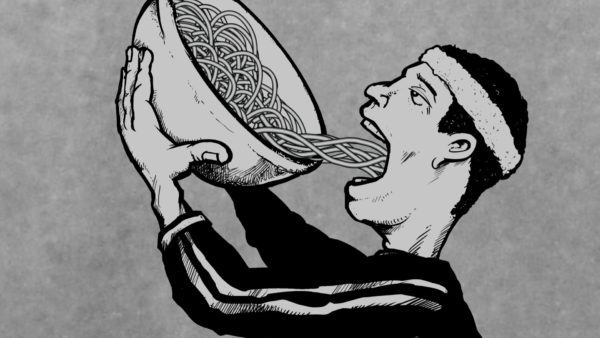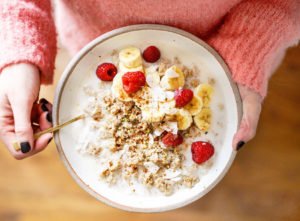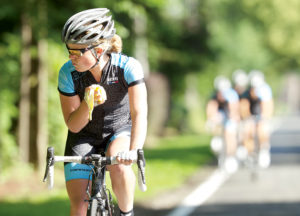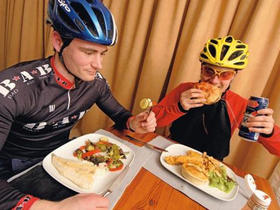Cycling nutrition is about more than just what you’re eating. You have to take into account how much energy you’re spending, and ensuring you are getting the right nutrients at the right times to feed those muscles. Whether your goal is weight loss, or to simply feel better and stronger on and off your bike, there are some mistake you’ll want to avoid.
As we reach the end of January, those New Year’s diets and resolutions may be already slipping into the background. That may not necessarily be a bad thing. When we focus too much on diets or what we can or cannot do and eat, it is easy to fall off the bandwagon. You want to establish a healthy lifestyle, rather than a simple health kick that will come and go before you can experience any real changes.
Here are some of the most common nutrition mistakes that cyclists make.

Skipping Breakfast
It doesn’t have to be a full-meal deal, but you want eat at least some breakfast, especially if you are planning on riding later. You have been effectively fasting overnight, so giving your body some fuel first thing will set the tone for your day and get your energy up. Not convinced? Here’s what eating breakfast will do for you:
- It boosts your metabolism.
- Keeps your blood sugar levels stable during the day
- Reduces risk of craving or overeating later.
That being said, don’t go stock up on breakfast cereals. Think smoothies, oatmeal (not the instant kind), fresh fruit, eggs, and whole grain toast.
Waiting too long to eat in between meals
If you don’t eat, then you’ll lose weight, right? No. Not only can that mentality can create the starve-binge eating pattern, but it’s also hard on your body. If you go too long without eating, when you do eat you are more likely to eat too much or eat the wrong things. This surge of insulin sends fat storage into overdrive, which is counterproductive to weight loss.
You should never go more than four hours without eating. Snacking can be your friend! Avoid high sugar snacks that will spike your blood sugar and then lead to a crash, but instead nibble on foods that will sustain your energy levels throughout the day.
 Not fueling properly
Not fueling properly
When you’re just starting out, or are focusing on weight loss, you may think that it’ll speed things up if you don’t eat before, during, or after a ride. However, if you’ve ever experienced undernourished muscles on a hard climb, you know this is not the case. You can get away with gels and bars on shorter rides, but if you are going out for hours at a time, you need to be fueling your body properly. You should also eat a small meal before your ride so you go in with energy to spare. (This does not mean carbo loading! See below…)
Carbo loading
There’s a bit of a misconception when it comes to carbo loading. Despite popular belief, it is not eating as many carbohydrates at a meal the night before a ride or event. That gigantic plate of pasta the night before your big ride is not carbo loading– it’s just a really big dinner. Most athletes do not even need to carbo load. The need arises if you are going to be pushing yourself at moderate to hard efforts for 2+ hours without access to food.
The goal of carbo loading is to ensure that you have maximum glycogen in your body for an an endurance ride or race. Glycogen is the fuel that powers your muscles, but there is an upper limit to how much glycogen a body can store. Recent research has revealed that it is most effective to do a short but intense workout before carb loading. This will make your muscles hungry for carbs so they will grab and store them for the upcoming event.
Post-ride binge
You’ve just finished a hard ride, so you’ve earned that large pizza, right? Not so much. It’s easy to eat just about anything that comes across your path after a ride, so make sure the right things cross your path. Plan a post-ride snack or meal ahead of time to save yourself from temptation.
Eating too late at night
Life gets busy, and it’s not always realistic to be sitting down to eat dinner at 5pm. Especially if you are training after work, you may not get home from the gym or a ride until 8pm. However, eating a big meal right before heading to bed can not only affect your sleep, but it also increases fat storage. The easiest fix is to try have your main meal at lunchtime, then have a small meal in the evening before you go to bed.
Eating too fast
With packed schedules it can be hard to have the time to sit down and eat slowly, but it’s important. Eating too fast results in eating too much. It takes about 20 minutes for your brain to catch up and tell you’re body it’s full, so if you just plow right through you’re going to miss those signals altogether.
Undereating and focusing too much on weight
It may tempting to starve yourself to reach that ideal weight and achieve that lean look in your lycra, but there are much healthier ways to get there. Eating disorders are surprisingly prevalent within the cycling world, and we need to be careful with our habits and our words (and how they may impact those around you). We should replace talk of losing weight with eating healthy and training hard.